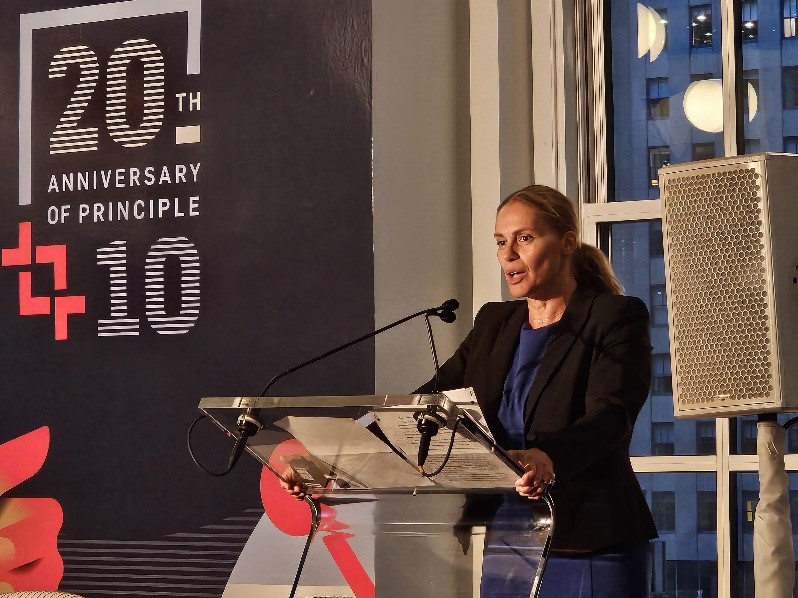
New York City, USA, 13 November 2024 – In September 2024, UNODC joined other international organizations partnering with the UN Global Compact in New York City, in a special event commemorating the twentieth anniversary of Principal Ten and highlighting how the Principle has fostered anti-corruption endeavours by the private sector to demonstrate commitment to integrity, transparency and accountability. Leaders from the business community, governments, academia, and civil society were present at the event.
Principle Ten was adopted in 2004 by the UN Global Compact and its private sector participants as a commitment to not only avoid bribery, extortion and other forms of corruption but also to proactively develop policies and programmes to address corruption internally and within their supply chains.
Principle Ten calls on companies to work with civil society, the United Nations, and governments to realize a more transparent global economy. The legal instrument for Principle Ten, the United Nations Convention against Corruption (UNCAC), entered into force in 2005. It is a unique instrument for developing comprehensive responses to corruption at the national, regional and global levels. At the time of the adoption of Principle Ten, tackling corruption had increasingly become a priority for businesses to allow them to inspire trust, retain talent and restore credibility among investors, customers, employees, and the public. However, there was inadequate guidance on concrete ways to prevent corruption in business dealings in an increasingly complex and globalized operating environment. In the intervening decade, resources have been developed by the UN Global Compact and its partners, including the United Nations Office on Drugs and Crime (UNODC), which give guidance on the various steps companies can take to prevent corruption in their operations.
UNODC published in 2013 An Anti-Corruption Ethics and Compliance Programme for Business: A Practical Guide, which provides practical recommendations for businesses looking to address corruption challenges, strengthen integrity measures and compliance programmes, and mitigate potential business risks – including through collective action. The concept of collective action has been central to efforts to promote public-private partnerships to stimulate efforts in the private and public sector to decrease corruption and engage in effective reform, level the playing field and create fair competition. and create fair competition.
The private sector has engaged with the collective action process over the last decade, and some businesses have now reached out to governments to foster effective governance models that support corporate anti-corruption measures. On 12 December 2023, on the twentieth anniversary of UNCAC, businesses united to sign the anti-corruption Call-to-Action, which represents not only a commitment to integrating anti-corruption into their strategies and operations, but also the collective appeal from business to governments in the hope of encouraging a sustainable and inclusive global economy.
Delivering a statement on behalf of UNODC Executive Director Ghada Waly, at the twentieth anniversary of Principle Ten, Delphine Schantz, Director of the UNODC Liaison Office in New York stated that, “The corruption challenges of today are growing more complex, overlapping with organized crime, new technologies, conflict, the environmental crisis and so much more. The private sector is integral to many of those problems and their solutions, and your consumers, investors, governments, and employees all expect big things from you.... As the guardian of Principle Ten, and of UNCAC, UNODC is committed to support companies in promoting business integrity by developing tools and providing technical assistance.”
One of the speakers at the event, Ivanna Alvarado, engaged in the UNODC project on Global Integrity Education, which fosters ethical decision-making in private sector employees by developing and implementing integrity education programmes in universities. The project provided university graduates, such as Alvarado, with opportunities to take part in business training programmes and to serve as Ethics Ambassadors, promoting ethical practices within participating companies.
“It is becoming increasingly clear that thinking about implementing a culture of integrity in companies is not only a moral obligation but also a strategic one, and it is necessary to incorporate new concepts that did not previously exist when discussing integrity in companies, such as emerging technologies and mental health,” Ivanna said.